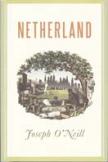Hans and the City
Before bringing out this book, Joseph O’Neill published two rather obscure novels and a well-received “family history” entitled Blood-Dark Track, which explored the mysterious political behavior of his grandfathers—one Turkish, one Irish. Toss in O’Neill’s insightful criticism for The Atlantic Monthly and his résumé is certainly admirable. Still, few could have predicted O’Neill would produce one of the year’s best-reviewed literary novels. “It has more life inside it than 10 very good novels,” raved a coveted front-page notice in The New York Times Book Review. Netherland is a wonderful 21st-century New York story, but such lusty applause may say more about the desperate state of fiction than the actual merits of O’Neill’s compelling yet understated novel.
It is heartening that Netherland is not another razzle-dazzle, postmodern novel of, by and for 23-year-old M.F.A.’s. Instead, it explores themes that at times have been brushed aside by literary tastemakers as dated: family, history, America and the kind of ambition with which Icarus (not to mention Jay Gatsby) would be familiar. A sense of gravitas also surrounds Netherland, presumably because it is yet another “9/11 novel.” O’Neill all but welcomes this description in his epigraph, citing Walt Whitman’s elegy to “a city invincible to the attacks of the whole of the rest of the earth.”
Ultimately, however, Netherland feels like a vibrant story about a crumbling marriage and star-crossed friendship that happens to unfold in post-9/11 New York (and post-7/7 London). To argue that O’Neill’s devastated main character, a Dutchman named Hans, is somehow a product or reflection of these devastated cities is tempting. But this ignores aspects of the human condition that we endure long before and after cataclysmic public moments. The attacks of September 2001 do drive Hans and his wife apart. Fearing another attack (as well as an “ideologically diseased” country such as America), she takes their son and flees to London.
Before outlining what is brilliant in the novel, we must deal with the book’s single serious flaw, and that is Hans’s wife. Perhaps O’Neill means to portray her as a symbol of smug anti-Americanism or a product of therapeutic jargon. (She laments the failures in “the narrative of their marriage.”) But none of this explains why a wounded yet decent fellow like Hans would want this loathsome person back in his life. Either way, it is the breakdown of Hans’s marriage that sets him adrift in New York, a city O’Neill constructs as both a fun house and insane asylum. Most impressive is O’Neill’s willingness—no, zeal—to cross the bridges and tunnels and explore the cricket fields and ferry terminals, graveyards and parakeet colonies of Staten Island, Queens and Brooklyn.
Staying at the Chelsea Hotel (where a guest dressed as an angel makes occasional appearances), Hans wanders the city and befriends a fellow immigrant, Chuck Ramkissoon, who introduces Hans to the hidden world of New York cricket—as well as unbridled immigrant optimism. “I love this country,” Chuck says. “Dog eat dog. No holds barred.” This may be naïve, even a fatal flaw, but Chuck’s outlook is also a tonic for the brooding Hans. At one point, Hans visits Chuck after a nightmarish trip to a Department of Motor Vehicles office in Manhattan. The infamously poor service has only worsened now that the Department of Homeland Security is in on the D.M.V. act. Hans is suddenly thrust into “a state of fuming helplessness” and is “seized for the first time by a nauseating sense of America, my gleaming adopted country, under the secret actuation of unjust, indifferent powers.” (Of course, most New Yorkers feel the D.M.V. has been “nauseating” folks roughly since the days of Henry Ford.) As part of his driving lessons, Hans becomes Chuck’s chauffeur, and is given a peek into Chuck’s hectic, occasionally dangerous life. Chuck’s grandest scheme is to erect an international cricket stadium (to be named, with patriotic grandiosity, Bald Eagle Field) atop the marshlands of Brooklyn’s Floyd Bennett Field. But this scheme, it turns out, has been made possible by dabbling in the underworld—which begins to explain why, when we meet Chuck on the first pages of Netherworld, he is floating in the Gowanus Canal.
O’Neill’s style is generally wry and understated, but his prose flourishes when his eye turns to New York’s vast landscape. In Queens, “a shabbily crowded graveyard with the monuments and tombs rising” is a “necropolitan replica of the Manhattan skyline in the background.” Such moments indeed make New York seem a city of death in the wake of 9/11. But the impression Netherland ultimately leaves with the reader is that despite the tragic global events, most of us will still be left to wrestle with family and friends, rather than historical forces. Really, would Hans’s marriage have been better had the attacks not occurred? True, the attacks play a role in Chuck’s idea for the cricket arena. But he is such a force of nature, it is clear he would have dreamed grandly no matter what.
In the wake of the catastrophic Lisbon earthquake of 1755, Voltaire’s Candide surveyed the world and unearthed diverse conflicts both pathetic and profound. As the Black Death roiled, Boccaccio unspooled The Decameron. Like it or not, life goes on following apocalyptic events—a clichéd bit of wisdom O’Neill portrays unsentimentally yet still elegantly. “It is truly a terrible thing,” Hans laments at one point, “when questions of love and family and home are no longer answerable.” It is to O’Neill’s great credit that though historical and political questions darken the air of his novel like floating ash, he renders the more mundane struggles of life with no less heat, emotion or poetry.
This article also appeared in print, under the headline “Hans and the City,” in the October 20, 2008, issue.








